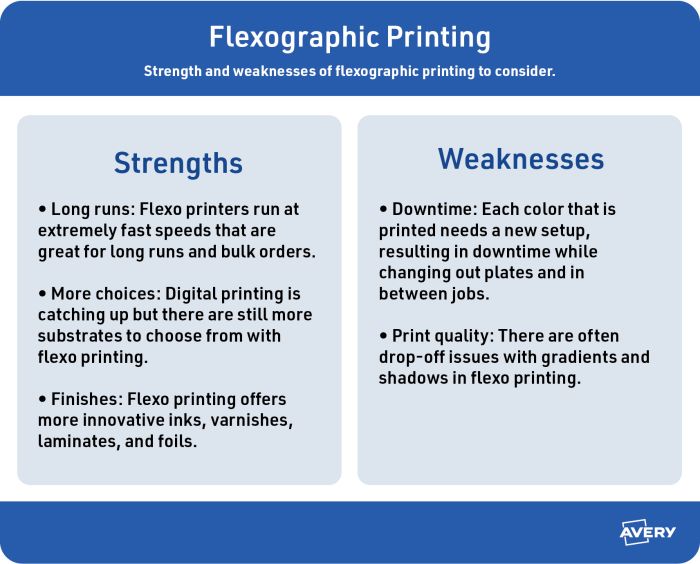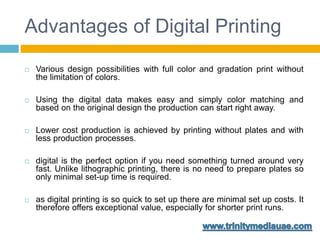Rumored Buzz on Digital Printing
Rumored Buzz on Digital Printing
Blog Article
Getting My Digital Printing To Work
Table of ContentsIndicators on Digital Printing You Should KnowSome Of Digital PrintingDigital Printing - An OverviewWhat Does Digital Printing Do?Digital Printing for DummiesThe Of Digital Printing
has the advantage of just printing what you require. Countered printing's high configuration costs stop it from being cost-effective for runs of 100, 10, and even a solitary copy. A personalized message is always well received by clients. Digital printing enables for basic personalization of marketing materials. Smaller, more cost-efficient batches allow companies customize each order. Have a sale for the return to institution. Additionally, you can customize your newsletters for repeat customers by resolving them by name. Variable data printing, such as direct-mail advertising with personalized codes and addresses, is ideally matched for digital printing. Making modifications to your layout at the last minute is much simpler with electronic printing. It aids in. And this printing approach guarantees accuracy, so styles will constantly look the exact same. Alternatives for paper stock, finishes, and various other attributes will remain to grow as modern technology advances. When it pertains to printing, Seattle Design and Print is amongst one of the most trusted business around. Digital fast printing only requires four steps of style, testimonial, printing and binding to obtain everything done. Typical printing covers a big area and calls for a large investment in technology. The financial investment of approximately 10sof numerous yuan has actually made some tiny and medium financiers inhibited and vulnerable. The core of Digital Express is software application. As long as the software application updates can keep up, Digital Express will constantly be at the leading edge of the printing sector. And a collection of software application of numerous thousand yuan is also little contrasted to a set of devices of several
million yuan. One or two individuals, a dozen square meters of store, can open a digital specific printing store. Digital quick printing has an unrivaled benefit: print as needed - Digital Printing. The modern-day business design is flexible and versatile, and it is reflected in the published matter. It
is most likely that today's needs are various from yesterday.
According to PMMI, electronic printing permits brands and producers to react quickly to client needs while enhancing the supply chain, reducing warehousing cost and waste, and enjoying faster time to market. That all noises terrific, however how does this modern technology do all that? The major differentiator of these modern technologies is that there are no set up charges and no plates with digital printing.
All About Digital Printing
According to Wikipedia, the best difference in between electronic printing and conventional approaches such as lithography, flexography, gravure, or letterpress - Digital Printing is that there is no requirement to change printing plates in electronic printing, whereas in these analog printing methods the plates are repeatedly replaced. This causes quicker turn-around time and lowers cost when utilizing electronic printing.
Rapid production suggests obtaining your product to market much faster. It also implies it's less complicated and faster to hop over to these guys make changes later, when you change a recipe, add a SKU, or produce seasonal packaging. Digital printing is highly flexible, so it's simple to make changes to the package design quickly. All of it returns to the plates.
Much more supply can imply even more waste in the future. With standard printing methods, short-run printing is just not possible. Since a wonderful layout can make or break your product, electronic printing continually creates high-grade, clear and colorful graphics each time. Digital printing on versatile pouches includes the intense, lively, and specific graphics that virtually beckon consumers to connect and touch them.
Digital printing is the procedure of printing digital-based pictures directly onto a selection of media substratums. There is no requirement for a printing plate, unlike with offset printing. Digital documents such as PDFs or desktop computer publishing documents can be sent out straight to the electronic printing machine to publish on paper, picture paper, canvas, material, synthetics, cardstock and other substrates.
See This Report on Digital Printing
According to PMMI, digital printing allows brands and suppliers to respond rapidly to consumer needs while boosting the supply chain, decreasing warehousing expense and waste, and delighting in faster time to market. That all audios excellent, but exactly how does this modern technology do all that? The significant differentiator of these technologies is that there are no set-up costs and click here to read no plates with electronic printing.
According to Wikipedia, the greatest difference between electronic printing and typical techniques such as lithography, flexography, gravure, or letterpress is that there is no demand to replace printing plates in electronic printing, whereas in these analog printing techniques home plates are consistently replaced. This leads to quicker turn-around time and reduces price when making use of digital printing.

Fascination About Digital Printing
With standard printing methods, short-run printing is simply not possible. Because a great layout can make or break your item, electronic printing constantly produces premium, clear and colorful graphics each time.

According to PMMI, digital printing allows brand names and producers to respond promptly to consumer needs while enhancing the supply chain, lowering warehousing price and waste, and enjoying faster time to market. That all audios great, but exactly how does this innovation do all that? The major differentiator of these modern technologies is that there are no set up charges and no plates with digital printing.
Digital Printing - The Facts
According to Wikipedia, the best difference in between digital printing and conventional techniques such as lithography, flexography, gravure, or letterpress is that there is no need to change printing plates in electronic printing, whereas in these analog printing approaches home plates are continuously replaced. This leads to quicker turn-around time and decreases expense when making use of here are the findings digital printing.
Digital printing is highly flexible, so it's simple to make adjustments to the plan style promptly. It all goes back to the plates.

What Does Digital Printing Do?
Digital printing is the procedure of printing digital-based pictures directly onto a selection of media substratums. There is no demand for a printing plate, unlike with offset printing. Digital files such as PDFs or desktop publishing files can be sent straight to the digital printing press to print on paper, photo paper, canvas, fabric, synthetics, cardstock and other substratums.
Report this page